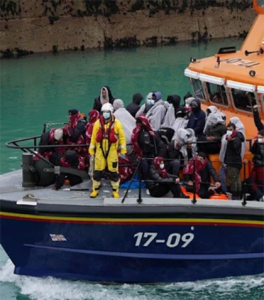UK’s bitter mix of migration and politics
The deaths by drowning of 27 migrants attempting to reach the UK in a small boat has dramatically underscored the toxic politicisation of the issue migration in Britain.
The ruling conservative government has amped up migration as a public issue with an election approaching.
 The UK government is making dubious claims that there are “record” numbers of migrants reaching Britain’s shores.
The UK government is making dubious claims that there are “record” numbers of migrants reaching Britain’s shores.
The optics of small boats crossing the channel is threatening political support for Boris Johnson’s government as the more voices on the right call for radical new measures to stem the increase in arrivals.
Mr Johnson is reported to be exasperated over the issue and is said to be considering even more outlandish schemes such as sending the refugees 12,800 kilometres south to the Falkland Islands.
A recent poll of conservative found 77 per cent thought that the government was “too soft” on migrants.
Mr Johnson had appointed Stephen Barclay, the Cabinet Office minister, to head a cross-government task force to resolve the issue of small boat crossings, which are mostly undertaken by Iranians, Iraqis, Eritreans and Syrians.
But the histrionics from the British government saw them un-invited from a recent European summit on the issue of migration.
One of the problems the government faces is that despite Home Secretary Priti Patel’s claims that 70 per cent of the asylum seekers are economic refugees, overwhelmingly most are found by panels to be genuine refugees.
And the issue has become caught up in the broad post-Brexit deal negotiations over the Northern Ireland Protocol.
The political fall-out, with pictures of refugees landing on British beaches, has led to increased calls for them to be processed in third countries.
The Home Office has been in talks with several territories to send the migrants to them while they are assessed for asylum, similar to Australia’s use of an off-shore island.
Denmark, St Helena, Rwanda and Albania have also all been considered.
But experts say Britain’s tougher immigration and asylum policy is unlikely to stem the flow of migrants attempting to cross the English Channel.
Observers says that limited access to, or inadequate safe and legal avenues, are contributing to more people taking alternative means, including crossing the Channel in small boats.
Founder of the Care4Calais NGO Clare Mosely says that “boat crossings are one of the very few ways that people can get to the UK to claim asylum.
“For all practical purposes there is no legal way to travel, so the only choice is whether you risk your life in a small boat or hidden in a lorry,” she said.
Trucks have waned in popularity as the length of time needed for a successful crossing has lengthened due to technological advances.
Dr Peter Walsh, a researcher at the University of Oxford’s Migration Observatory, says “the route has become more established, probably with better-organised trafficking networks, in part likely due to increased policing on other routes”.
There is no agreed reason why people choose to go to the UK illegally but it is believed to be a combination of factors, including the presence of family members or acquaintances, their belief that the country is open, safe and tolerant and their ability to get by with a few words of English.
There are also no identity papers in the UK so people can more easily find undeclared work.
It may also be that they have been refused asylum in EU member states and ordered to leave and see the UK as their last chance.
Britain is seeing far fewer numbers of asylum seekers than continental countries.
Around 29,450 applications for asylum were lodged in the UK in 2020, according to government figures – down from a peak of 84,132 in 2002.
More than 416,600 new asylum claims were lodged in European Union member states last year, including 102,500 in Germany, 81,800 in France, 37,900 in Greece and 21,200 in Italy.












